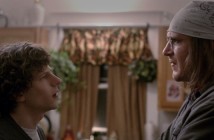
Cast: Andy Lau, Tony Leung, Anthony Wong
Directors: Andrew Lau, Alan Mak
Country: Hong Kong
Genre: Action | Drama
Official Trailer: Here
Editor’s Notes: The following review of Infernal Affairs is part of our coverage for TIFF’s A Century of Chinese Cinema which runs from June 5th to August 11th at TIFF Bell Lightbox. For more information of this unprecedented film series visit http://tiff.net/century and follow TIFF on Twitter at @TIFF_NET.
Hong Kong had already re-invented the cop thriller with the likes of John Woo’s A Better Tomorrow and Hard Boiled long before Infernal Affairs arrived. But despite a poster campaign that showed drawn guns held by tough-as-nails cops, there would be no slow-motion shoot-outs in burning buildings this time around. No motorbikes careering through windows. No slickly concealed weapons. And, most important of all, there would be no redemption.
The flow of the film gives almost no room for the characters to catch a breath, even in moments of quiet, keeping the extraordinary tension always front and centre.
Moles and double crosses had been rife in cinema for decades by 2002, from the obvious spy movies to tales of the gangland snitch. Infernal Affairs changed the game by focusing on, and contrasting, two moles sent almost simultaneously into opposing outfits – one a triad gangster who works his way up the Hong Kong police force food chain, the other a uniquely talented undercover cop placed deep within the triad’s inner circle. It would be enough to just compare the activities of these dramatic foils, but Infernal Affairs goes one step further, having their paths collide as each becomes involved in the search within their organisation for the mole. The pair are hunting one another and simultaneously hunting themselves.
 The tantalising intrigue of the story (which would lead to the inescapable U.S. remake; Martin Scorsese’s The Departed) is heightened by the two lead performances, Tony Leung as scruffy cop-as-gangster Chan, and Andy Lau as clean-cut gangster-as-cop Lau. Their contrasting cool demeanours are constantly tested as the jig repeatedly teeters on being up, and each actor finely displays the panic that sets in when danger, and the truth, nears. Leung particularly captures Chan’s identity crisis as he begins to forget his duty, as the only people who know his true identity begin to die one by one. Faced with the possibility of being trapped in the triad forever, Chan begins a course of psychotherapy with a beautiful therapist that gives him his few moments of respite in the film.
The tantalising intrigue of the story (which would lead to the inescapable U.S. remake; Martin Scorsese’s The Departed) is heightened by the two lead performances, Tony Leung as scruffy cop-as-gangster Chan, and Andy Lau as clean-cut gangster-as-cop Lau. Their contrasting cool demeanours are constantly tested as the jig repeatedly teeters on being up, and each actor finely displays the panic that sets in when danger, and the truth, nears. Leung particularly captures Chan’s identity crisis as he begins to forget his duty, as the only people who know his true identity begin to die one by one. Faced with the possibility of being trapped in the triad forever, Chan begins a course of psychotherapy with a beautiful therapist that gives him his few moments of respite in the film.
The contrast across the thin blue line is drawn ever stronger by the equally bullish operators at either end, Anthony Wong as Superintendent Wong and Eric Tsang as crime boss Hon. Old enemies, the pair equally complicate matters by their interactions with both Chan and Lau. The game of cat-and-mouse (or cat-as-mouse) escalates as both forces draw nearer to blowing the cover of the moles within their ranks.
A collaborative directorial effort between Andrew Lau (Young and Dangerous) and Alan Mak, Infernal Affairs cracks along at a startling pace, running almost an hour shy of its American remake. The flow of the film gives almost no room for the characters to catch a breath, even in moments of quiet, keeping the extraordinary tension always front and centre. While there are shout-outs and raids, it is the simpler moments of espionage – tapping out a target’s activities in Morse code on a window, the two unknown enemies tracking one another through a Hong Kong shopping centre – that really make Infernal Affairs so thrilling and memorable.
 The film has a crisp, blue-bleached look that heightens the dark nature of the subject matter while keeping the film uncomfortably bright. Andrew Lau, as chief D.P., keeps the characters in tight frames, especially in indoor scenes, underlining their trapped-between-two-worlds-ness. There are some terrific shots littered throughout the movie, but none ever overtakes the ultra-cool feel of the first rooftop encounter where a cop is seen reflected in the mirrored facade of a skyscraper.
The film has a crisp, blue-bleached look that heightens the dark nature of the subject matter while keeping the film uncomfortably bright. Andrew Lau, as chief D.P., keeps the characters in tight frames, especially in indoor scenes, underlining their trapped-between-two-worlds-ness. There are some terrific shots littered throughout the movie, but none ever overtakes the ultra-cool feel of the first rooftop encounter where a cop is seen reflected in the mirrored facade of a skyscraper.
The score is mostly suitably dramatic, briefly descending into karaoke-like pop during the film’s most dramatic scenes. Editing is quick, clean and clear; never confusing despite the complex nature of the story. The climax, so emotionally brutal that it had been softened for the remake, is simply chilling.
The tantalising intrigue of the story is heightened by the two lead performances, Tony Leung as scruffy cop-as-gangster Chan, and Andy Lau as clean-cut gangster-as-cop Lau.
While Wong Kar-Wai was making Hong Kong art cinema the toast of the world, Lau and Mak managed to create a cop thriller as intense and cool and minimalist as anything the finest filmmakers in the West could manage. It may not have the gloss of its Oscar-winning remake, but it has considerably more style, and its incredible pacing make it a must-see for all fans of the crime genre.
[notification type=”star”]80/100 ~ GREAT. There is something so satisfying about a film that manages to be so complex yet is presented so simply. The contrasts between the two leads and the blurring of the lines between good and evil make for terrific viewing. That it looks so good and flows so well is just a bonus. Oh, and how about that ending…![/notification]



